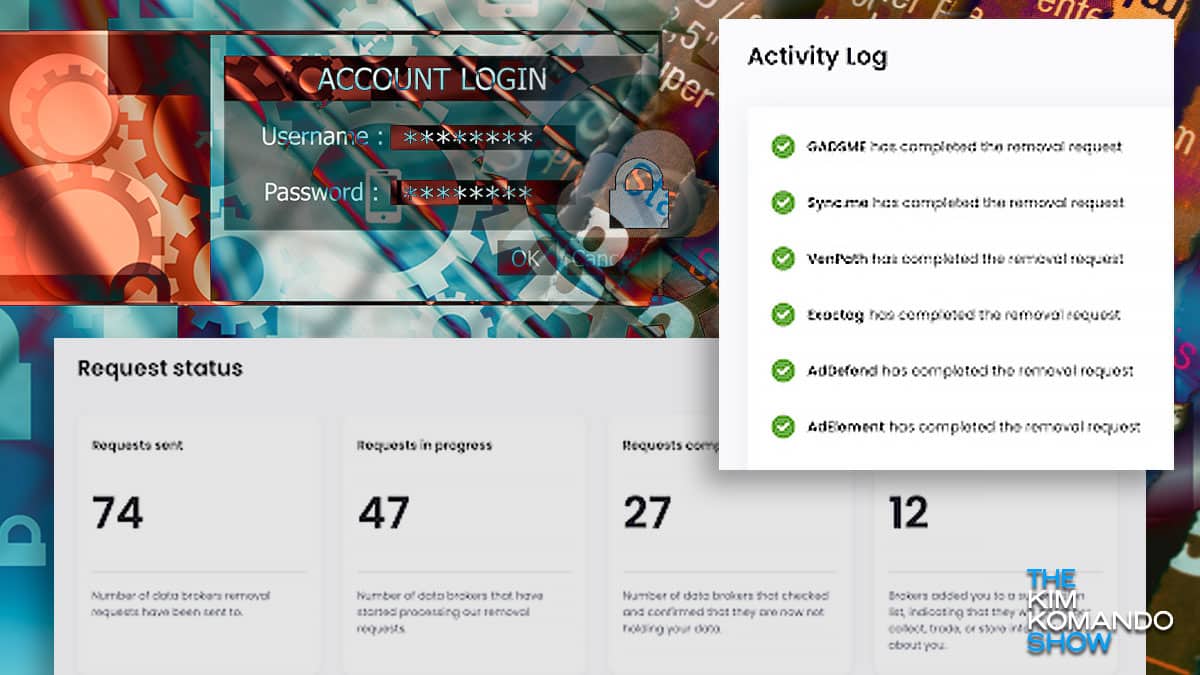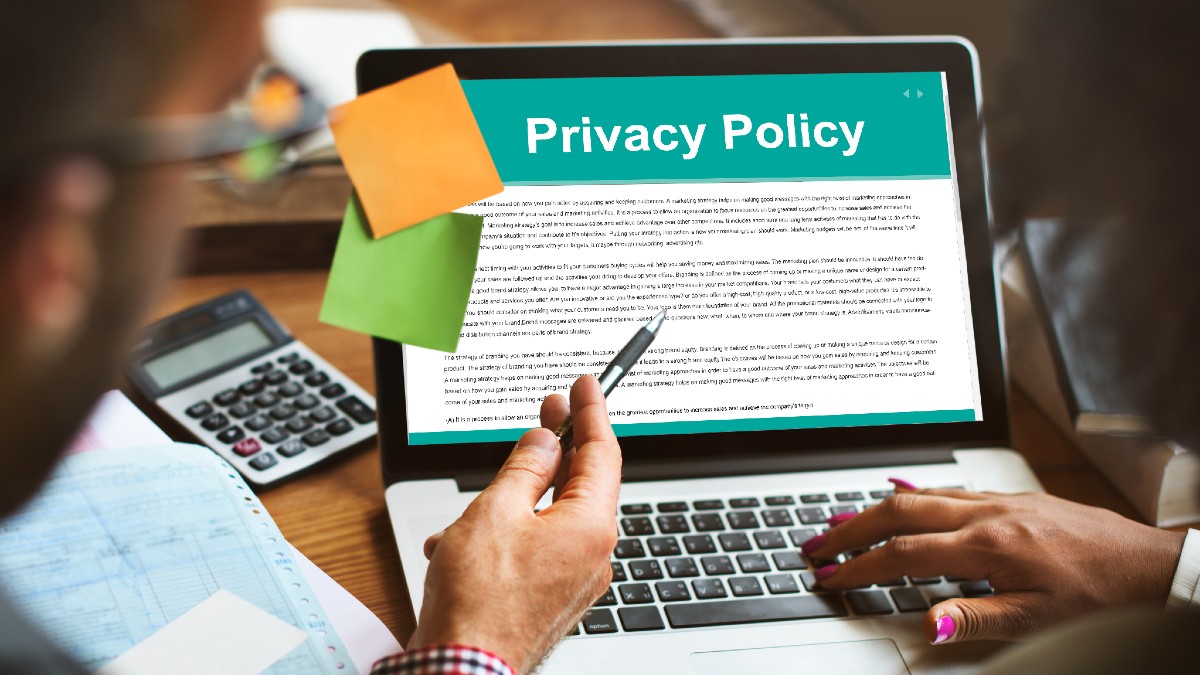The data broker had a massive data breach, leaking personal info on hundreds of thousands of people. Here’s what you need to know.
Your data: It’s all posted online - But there's a simple way to remove it

A loyal reader, Racquel, emailed me recently after dealing with a very angry customer at work. “Last week, she left me a voicemail and said that I was behind all her problems and she was ‘going to find’ where I lived.”
Scary, right? Even if you’re safe with what you do online, there’s so much public info about us floating around the web. And the worst part is that your personal info is out there for others to snap up completely free.
Racquel had heard me talk about Incogni, a service that removes your personal info from all the sites that exist solely to gather and share your info for their profit. “[Incogni] went to work right away. It’s going to be difficult for her to find my address,” she told me.
I want you to have that safety and protection, too. Let’s take a deeper look at who’s making money by giving away or selling your data online and what can happen to you when they do.
Data-hungry data brokers
Data brokers exist only to collect and sell your personal information, often without your consent. They gather data from public records, your online activities, retail sites and anything else they can find. This can expose you to:
- Profiling: These detailed profiles about you are sold to marketers, advertisers, and even employers or insurance companies.
- Identity theft: With enough information, bad actors can access your financial accounts or create new ones in your name.
- Spam and scams: Your contact info can be sold to telemarketers and scammers. That’s why you get spam calls, emails and text messages at all hours, day or night.
- Loss of privacy: All this data from various sources can paint a very detailed picture of your life. Just knowing it’s out there makes me queasy.
😡 Look, I tried to get myself out of the data brokers’ sites but gave up after three months. It was too frustrating and time-consuming. I decided to try Incogni after seeing an ad about the service, and I was very, very skeptical. I’m not sure how they do it, but Incogni got me out of these data-scraping sites.
Money-hungry people search websites
People-search websites aggregate information from public records such as court documents, voter registrations and property records, along with social media and other online sources. In the wrong hands, this can open you up to:
- Doxxing: That’s when bad guys publish your private info online (like your home address) to purposely make you vulnerable to threats across the web or in your home.
- Stalking and harassment: You don’t have to get doxxed for someone to use your personal info to track your whereabouts or target you for harassment. Stalking can start small, but it’s a nightmare that can last for years.
- Social engineering: Criminals use detailed information to target you with creepy, highly personalized scams that are harder to detect and resist. Think an old high school friend “reconnecting” out of the blue.
- Reputation damage: Outdated or incorrect information, like an arrest record, on people-search websites can drag your name through the mud and cost you opportunities.
Yup, I tried to get my name out of people-search sites. Like a bad rash, a new site pops up at every turn. I never thought it was possible, but Incogni got me out of these sites and put me on suppression lists so these garbage sites can’t put me back in.
How to remove yourself from US Search
Like it or not, your personal information is online for anyone to find. This can include your full name, address, phone number, police record, employment information and more. People search sites scrape this information from public records, court records, social media and other sources.
Lexis Nexis data breach: See if you’re at risk
🚨 Listen up: The FBI says scammers are now using deepfake audio to impersonate government officials. They clone voices that sound shockingly real to trick you into sending money or giving up personal info. Bottom line? If something feels off, hang up.
🎮 Kids and online games: When they play games online, they’re chatting with strangers since no friend request is needed. Anyone in the lobby can talk using a mic. Make sure they know not to share personal info and to never agree to meet up in real life. Too many wackos are behind the screen.
Simple digital privacy step everyone should know about

Data brokers, people search sites and online background check services, oh my. At the end of the day, they all do the same thing — scoop up your personal info and sell it to anyone interested. Marketers are at the top of the list, but scammers can also find your information this way.
Opt-Out Tuesday: How to remove your info from FamilyTreeNow

People search sites collect your information from publicly available sources and offer it to anyone interested, including thieves and scammers. There are countless sites like this. So, how do you protect your data? You need to remove it.
Major data breach at HR firm: A cyberattack at Kelly Benefits exposed personal info from over 400,000 people. Hackers got basically everything needed for identity theft. The company says there’s no sign of misuse yet, but they’re offering 12 months of free credit monitoring. Never stops.
😤 Sick of strangers selling your personal info? That’s why I use and trust Incogni. It forces data brokers to delete your private information automatically. Right now, you can get 60% off with my exclusive deal . It’s a small price to pay for real peace of mind. Take back control of your privacy today!
🚨 Health data breach alert: Yale New Haven Health is dealing with the biggest health data breach of 2025 (so far). Over 5.5 million patients’ personal info, like names, addresses, SSNs and medical record numbers, is floating around the dark web. Watch for unexpected explanation-of-benefit letters in the mail.
🧬 23andMe filed for bankruptcy: I’ve been warning you about this for years. They’re selling off what they can to pay the bills, and that includes your personal info and genetic data. Delete your account ASAP before someone gets your DNA. Go to Profile > Settings > 23andMe Data > View > Delete Data, then confirm the deletion via email.
Tesla owners doxxed - March 22nd, Hour 1
A website called Dogequest leaked personal info of every Tesla owner in the U.S. If you own one, you’re now a target. Do you pay for Netflix, Hulu or Disney+? Cutting the cord isn’t cheap. Amazon is always listening, and meet your new AI nurse.
Scammers pretending to be the IRS: They’re sending out phishing texts claiming you’re eligible for a $1,400 Economic Impact Payment. The message includes a link that looks like the IRS website, but it’s a trick to steal your personal info or install malware. Remember, the IRS never contacts taxpayers by text — official notices always come by postal mail.
Peter Pan always flies because he never lands: A former Disney engineer thought he was downloading an AI image generator. It was malware. Hackers stole his personal info and Disney data, then dumped it all online. That’s not even what got him fired. He was watching porn on his work computer. Dummy.
📅 Don’t RSVP: If you get a random Google Calendar invite, don’t click on any links. Scammers are tricking folks with Gmail accounts into sharing their personal info through a fake support page. Legit invites come from calendar-notification@google.com. Report phishing: Hit the three-dot icon in the right-hand corner.
Operation Level Up: The FBI is calling people who fell for crypto scams to stop them from losing even more money. So far, of 4,300 folks across all 50 states, 76% had no clue they were being scammed. If you get a call, the real agency won’t ask you for money or tell you to move yours. They also won’t request your personal info or try to move your chat to an encrypted app.
TikTok addicts kids in 35 minutes
Just over half an hour. That’s all it takes for kids to get hooked on TikTok, according to leaked internal documents. Plus, why being nice to chatbots might benefit you, and what’s going on with Sam Altman’s mysterious orb device. Kim also talks to Darius Belejevas, head of Incogni, about how data brokers collect your personal info — even if you never gave it to them.
AI Elvis, Apple malware skyrocketing & life-saving 911 app
Plus, Angela Laws has traveled the world for free — thanks to a house-sitting app. I talked to her about how you can do this, too. An herbal supplement sold online is killing people, gas tanks versus EV chargers and how to remove personal info from Google.
The best 3 minutes I spent on privacy in 2025

I know, big statement, right? But stay with me.
I’ve been talking about people search sites for years. Heck, I did a whole series of articles on how to remove yourself from them.
Your personal info is all over the internet - 3 ways to remove it

Whether you know it or not, your personal and private information is all over the internet. You don’t need to be active on social media or forums. Much information comes from publicly available sources such as court records and your online accounts (active or otherwise).